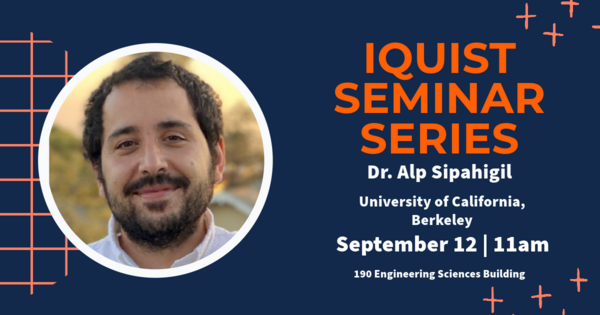
IQUIST Seminar: "Defect-engineered photonic and superconducting quantum circuits," Alp Sipahigil, Assistant Professor, University of California, Berkeley
- Event Type
- Seminar/Symposium
- Sponsor
- IQUIST
- Location
- 190 Engineering Sciences Building, 1101 W Springfield Ave, Urbana, IL 61801
- Date
- Sep 12, 2023 11:00 - 11:50 am
- Speaker
- Alp Sipahigil, Assistant Professor, Electrical Engineering and Computer Science, University of California, Berkeley
- Contact
- Hannah Stites
- hstites2@illinois.edu
- Phone
- 217-300-4072
- Views
- 458
- Originating Calendar
- IQUIST Seminar Series
Defect-engineered photonic and superconducting quantum circuits
Abstract: The past decade witnessed major advances in our ability to engineer integrated quantum systems. A growing number of industrial efforts are now focusing on scaling quantum technologies based on these platforms. In this talk, I will present our work on addressing outstanding device physics challenges to enable next-generation integrated microwave, phononic, and photonic quantum technologies.
Silicon photonics is the backbone of our modern telecommunication infrastructure and builds on decades of semiconductor manufacturing expertise. However, its application to quantum computation and communication is currently limited by the lack of strong spin-photon and photon-photon interactions. I will discuss a new approach to address this challenge using recently discovered telecom-band quantum emitters in silicon. I will present our first-principles search for an ideal defect in silicon1,2,3, and discuss experiments demonstrating indistinguishable photon generation from a single silicon defect for the first time4. I will conclude by discussing our recent progress towards realizing an integrated photonic quantum repeater node and advancing superconducting quantum processors via defect engineering.
[1] Y. Xiong et al., “High-throughput identification of spin-photon interfaces in silicon”, arXiv:2303.01594 (2023)
[2]Y. Xiong at al., “Midgap state requirements for optically active quantum defects”, arXiv: 2302.10767 (2023)
[3] Dhaliah et al., “First-principles study of the T center in silicon”, Phys. Rev. Materials 6, L053201 (2022)
[4] Komza et al., “Indistinguishable photons from an artificial atom in silicon photonics”, arXiv:2211.09305 (2022)Bio: Alp Sipahigil is the Ping & Amy Chao Family Assistant Professor of Electrical Engineering and Computer Sciences at the University of California, Berkeley. He has joint appointments as a Faculty Scientist at the Materials Sciences Division at Lawrence Berkeley National Laboratory and a supporting appointment at UC Berkeley Physics. He leads the Berkeley Quantum Devices Group which focuses on solid-state device research to advance quantum computation, communication, and sensing. His group studies a wide range of physical systems including superconducting quantum circuits, color centers, integrated photonics and phononics.
Prior to joining Berkeley in 2021, he was an Institute for Quantum Information and Matter postdoctoral scholar at Caltech. He received his Ph.D. in Physics from Harvard University in 2017 and his B.S. degrees in Physics and Electrical Engineering from Bogazici University in 2010.
To watch online go to the IQUIST YouTube channel: https://www.youtube.com/channel/UCCzAySwQXF8J4kRolUzg2ww